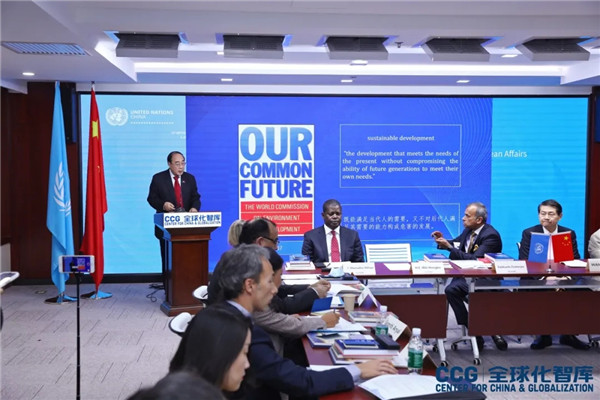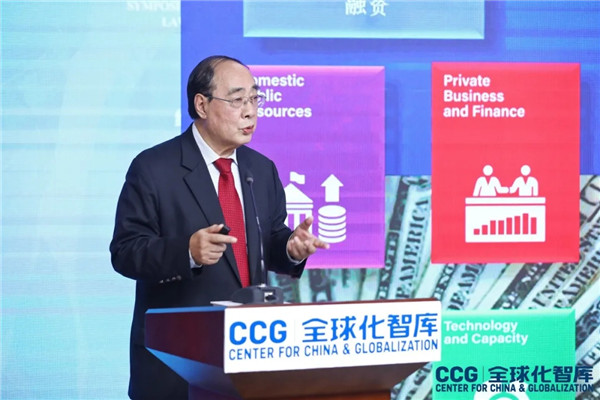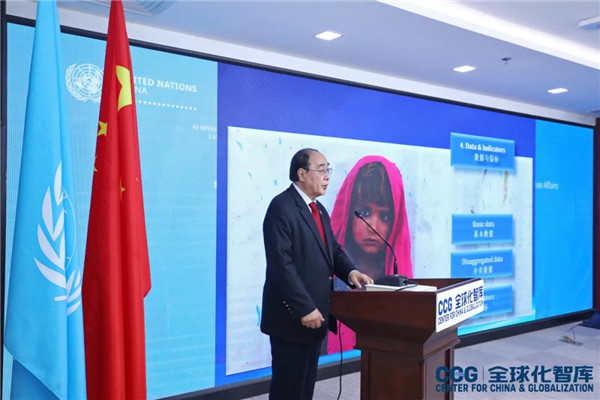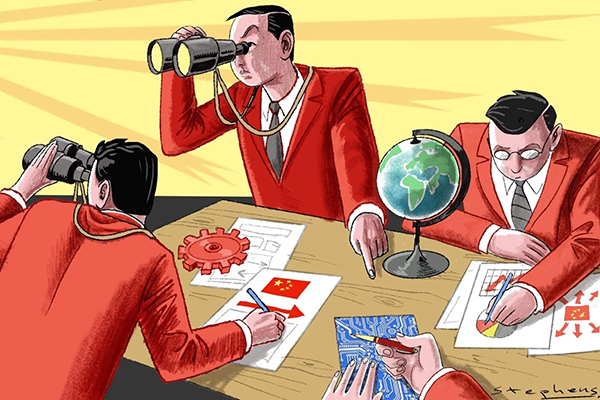Wu Hongbo: Sustainable Development calls for Better Governance
November 02 , 2021
On Nov. 2nd 2021, the United Nations in China and the Center for China and Globalization (CCG) co-hosted a symposium to celebrate the 50th Anniversary of the restoration of the lawful seat of the People’s Republic of China in the UN in Beijing.
Wu Hongbo, Special Representative of the Government of China on European Affairs, made his remarks at the symposium.

Full text of his opening remarks is as below:
Ladies and Gentlemen,
In 1987, the 42nd UN General Assembly endorsed an important document called “Our Common Future”, also known as “Brundtland Report”. It defined for the first time the “sustainable development” as “the development that meets the needs of the present without compromising the ability of future generations to meet their own needs.”
Ever since then, the international community has been working actively to enrich the content of sustainable development with enormous outreach efforts. 28 years later, the UN reached two landmark agreements in 2015, namely the 2030 Agenda for Sustainable Development and Paris Agreement on Climate Change. The UN has further defined the sustainable development as the development with a combination of economic growth, social justice and environmental protection. As a former UN official, I am very pleased to see that the sustainable development is enjoying increasing and widespread popular support.

Ladies and gentlemen,
This year is extraordinary for the Chinese people. It marks the centennial of the Communist Party of China and celebrates the 50th anniversary of the restoration of China’s lawful seat in the United Nations.
Over the past 50 years, China has successfully moved from a poor country to the world second largest economy. China has been sharing COVID response experience with the rest of the world while sending large quantities of supplies, vaccines and medicines to other countries.
China met successfully the UN Millennium Development Goals. The Chinese people have now enjoyed moderately prosperous living standards with the unprecedented eradication of absolute poverty this year. China has reached SDG1 ten years ahead of schedule and contributed over 70% of global poverty reduction.
UN Secretary-General Antonio Guterres said: in the decades since China has become an increasingly important contributor to the work of the Organization and a major pillar of international cooperation.

Ladies and gentlemen,
The COVID-19 is threatening our health, destroying economies,and livelihoods and deepening poverty and inequalities, thus threatening our very existence.
Covid-19 pandemic has pushed 70 million people back to extreme poverty, added 83million more to the hungry population, making SDG1 of eradicating poverty and SDG2 of ending hunger more difficult to reach.
2,500 billionaires in the world have their combined wealth increased daily by 5.2 billion dollars while 4 billion people the world over have not even basic form of social security. 7.6 million people are displaced by conflicts and crisis。
The density of carbon dioxide is 148 times higher than the pre-industrial level. One billion species in the world are in danger of extinction while 10 million hectares of forests are lost every year. We are now on the fringes of a disaster and the window of hope is closing on us fast.
Ladies and gentlemen,
Our organizers have rightly chosen the Common Prosperity and Climate Change as the main topics for today’s round table discussions. I shall leave these subjects to panelists for their valuable opinions and expert advices. As former UN USG personally involved in the formulation of the SDGs, I wish to share with you my observations on the governance in implementing the sustainable development.
1. Political Will.
(1) The will must be “people-oriented”. We have witnessed too many cases where political factions’ interests prevail over the interest of general public. Recently Federal Reserve reported that the combined wealth of the super rich accounting for 1% of the US population surpassed for the first time the total wealth of the entire middle class families in the country. When you read this you would understand the significance of people-centric concept.
(2) The will should remain unchanged despite the change of governments. The recent change of US governments is a case in point. We all know how much damages could be done to SDG implementation and climate change efforts.
2. Organization.
(1) Localization. SDGs though internationally agreed are not legally binding. Therefore they should be incorporated into national development strategy for better implementation. Soon after the UN endorsed the 2030 Agenda in 2015, Chinese President Xi publicly committed to incorporating all the SDGs in China’s 13th Five-Year-Plan.
(2) Cross-cutting. SDGs are all cross-cutting in nature, and call for trans-ministerial coordination. China had put in place a cross-sector mechanism composed of 47 ministries for SDG implementation in China
(3) Field operation. The Chinese government sent 250,000 task teams with 5 million officials to each and every poor village for poverty relief operation. As a result, near 100 million people have been helped out of poverty.
3. Accountability.
(1) Division of responsibility. All Chinese government agencies and officials have their specific responsibilities. In addition, China even invented river and lake chief system to ensure all the river and lakes are under supervision and well managed.
(2) Disciplinary sanctions. Those failing to perform their duties shall be disciplined accordingly. Since the Delta variant broke out, China held more than 100 officials accountable for neglecting their duties, and no patients die, while in another large developed country, non in default is held accountable, more than 50,000 patients died. The sharp difference is obvious.
4. Data and Indicators.
(1) Basic data. More than 100 countries have no accurate birth & death registration, and over 77 countries have no sufficient information on poverty. Without basic data there will be no SDGs.
(2) Disaggregated data. This is highly necessary for focused relief efforts. However, disaggregated information is even challenging for rich countries. Now China has both complete basic data and disaggregated information for both SDG implementation and Climate change actions
(3) Indicators. We have 17goals, 169 targets, 231 indicators. However, the UN indicators, designed to cater for all the circumstances, are general in nature. They need to be strengthened with local indicators. For example, in SDG1 extreme poverty is daily consumption less than 1.25 USD (now raised to 1.9 USD). In China, we have “Two not worries” (food and clothing), and “Three guarantees” (education, medical care, and housing). It is obvious, Chinese indicators are more specific and practical with standards higher than UN indicators.
5. Financing.
(1) Full mobilization. We should make the best use of all resources, including domestic public resources, private finances, development cooperation. trade, sustainable debt and capacity building. In the past 8 years, Chinese government alone earmarked 25.3 billion USD for poverty relief, created 14,000 large enterprises and 719,000 farmers’ coops which benefit 72% of the poor families.
(2) Innovation. Conventional financing is not sufficient, innovation is necessary. In China, public and private enterprises, NGOs are all mobilized to help. Poor people are helped with vocational education and professional training, small-sum relief loans, e-commerce, tourism, and forestation. For example, PV power stations were built in 100,000 poor villages, which have brought 30,000 USD to each village for creating new jobs or subsidizing the poor. E-commerce has covered all 832 poor counties to boost local trade.
In short, we need people-centered and efficient governance for both implementing SDGs and stopping global warming.
President Xi said in St. Petersburg Russia, sustainable development is the golden key to the solutions of current global challenges. Let us work together for global sustainable development for our generation and generations to come.
Topical News See more






